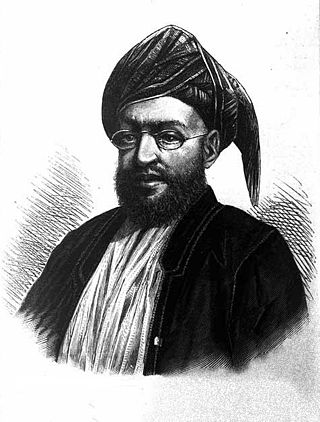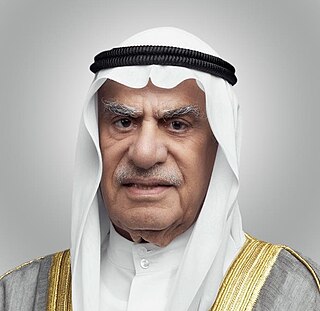Related Research Articles

Kuwait is an emirate with a political system consisting of an appointed judiciary, appointed government, and nominally elected parliament.

The emir of the State of Kuwait is the monarch and head of state of Kuwait, and is the country's most powerful office. The emirs of Kuwait are members of the Al Sabah dynasty.

The National Assembly is the unicameral legislature of Kuwait. The National Assembly meets in Kuwait City. Because political parties are illegal in Kuwait, candidates run as independents. The National Assembly is made up of 50 elected members and 16 appointed government ministers.

Kuwait is divided into five multi-member constituencies for the election of members to the unicameral National Assembly. These five electoral districts represent 112 residential areas distributed among the six governorates of Kuwait. Each constituency, regardless of population, directly elects 10 representatives to the National Assembly via plurality vote, for a total of 50 members.

SayyidBarghash bin Said al-Busaidi, an Omani Sultan and the son of Said bin Sultan, was the second Sultan of Zanzibar. He ruled Zanzibar from 7 October 1870 to 26 March 1888.

Sayyid Khalifa I bin Said al-Busaidi, GCMG, was the third Sultan of Zanzibar. He ruled Zanzibar from 26 March 1888 to 13 February 1890 and was succeeded by his brother, Ali bin Said.

Elections in Kuwait are held for both the National Assembly and for the Municipality. Kuwait's constitution calls for elections to the unicameral National Assembly at a maximum interval of four years. Elections are held earlier if the Constitutional Court or Emir dissolve the parliament.

Emily Ruete, born in Zanzibar as SayyidaSalama bint Said, also called Salme, was a Princess of Zanzibar and Oman. She was the youngest of the 36 children of Said bin Sultan, Sultan of the Omani Empire. She is the author of Memoirs of an Arabian Princess from Zanzibar.

General elections were held in Kuwait on 29 June 2006. They were the first elections in Kuwait in which women were able to vote and run for office.

Ahmed Abdulaziz al-Sadoun is the Speaker of the Kuwaiti National Assembly from June 20, 2023. He was previously the speaker from 1985 to 1999, from February 2012 until it was declared that the February 2012 elections were invalid and from October 2022 until it was declared in March 2023 that the September 2022 elections were invalid. He is the leader of the Popular Action Bloc in the Assembly and served for eight terms.

The Constitution of Kuwait was created by the Constitutional Assembly in 1961–1962 and signed into law on 11 November 1962 by the Emir, the Commander of the Military of Kuwait Sheikh Abdullah III Al-Salim Al-Sabah.

Kuwait is an emirate with an autocratic political system. The political system consists of an appointed judiciary, appointed government, and nominally elected parliament.
Hasan Johar is a member of the Kuwaiti National Assembly, representing the first district. He is a Kuwaiti of Iranian descent.

Kuwait National Assembly No-Confidence Votes are a process of questioning Cabinet ministers, which can lead to their impeachment. The government usually avoids impeachment through resignations, reshuffles and dissolving the legislature. Since its inception in 1962, the National Assembly of Kuwait has questioned more than 30 ministers, forcing some to resign, but only done so with a premier once on March 28, 2012.

The Arab Customs Union is a customs union announced at the Arab League's 2009 Arab Economic and Social Development Summit in Kuwait in order to achieve a functional customs union by 2015 and an Arab common market by 2020 and to increase inter-Arab trade and integration.

National Association for Change(Arabic: الجمعية الوطنية للتغيير) is a loose grouping of the various Egyptian of all political affiliations and religion, men and women, including representatives of civil society and young people aims to change Egypt. There was general agreement on the need to unite all the voices calling for change within a National Assembly. Mohamed ElBaradei is in-charge of the National Association for Change. The movement aims for general reforms in the political scene and achieving some of those procedures and guarantees necessitates the amendment of articles 76, 77, and 88 of the constitution as soon as possible. Worth mentioning is that the banned political group the Muslim Brotherhood were represented by one of their key figures who attended the meeting however their stand in accepting a non-member of their group as a candidate is yet unclear. It is also unknown whether Amr Moussa the head of the Arab League who met with Elbaradei a day earlier will be part of the new movement. The goal of the group is to bring about political reform based on democracy and social justice.

Mishal Al-Ahmad Al-Jaber Al-Sabah is Emir of Kuwait. Mishal spent most of his career in Kuwait's security and intelligence apparatus. Prior to becoming emir at age 83, he was the oldest crown prince in the world.

The Crown Prince of the State of Kuwait is the heir apparent to the Emir of Kuwait. Under Article 4 of the Constitution of Kuwait, this position can only be held by the descendants of Sheikh Mubarak Al-Sabah, and must be designated within a year of the Emir's accession. This designation is given effect by a combination of the Emir's nomination, and its approval by the National Assembly, as signified by a majority vote of its members in a special sitting. If this does not happen, the Constitution requires the Emir to nominate three descendants of Sheikh Mubarak Al-Sabah, of whom the National Assembly will pledge allegiance to one as the Crown Prince or heir apparent. To be appointed, the nominee must also have attained the age of majority, be of sound mind, and be the legitimate son of Muslim parents.
Events in the year 2022 in Kuwait.
References
- ↑ [ permanent dead link ]